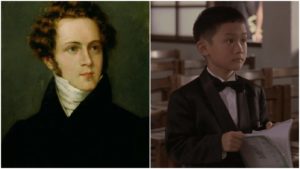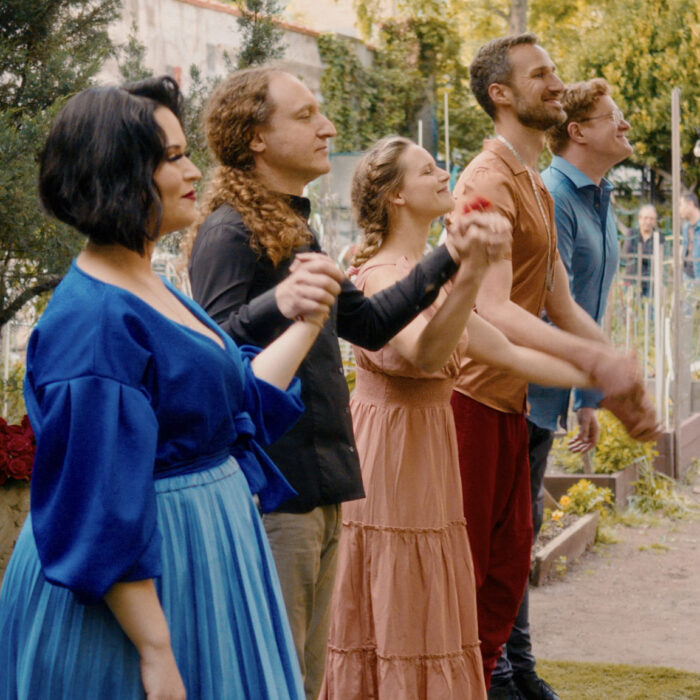
Opera Meets Film: How a Short Bellini Song Thematically Ties Together Edward Yang’s Novelistic ‘Yi Yi’
By David Salazar“Opera Meets Film” is a feature dedicated to exploring the way that opera has been employed in cinema. We will select a film section or a film in its entirety and highlight the impact that utilizing the operatic form or sections from an opera can alter our perception of a film that we are viewing. This week’s installment features Edward Yang’s “Yi Yi.”
Bellini’s “Vaga Luna” is all about longing in a time of loneliness.
Throughout the song, the narrator begs the moon, his /her “sole witness” to reach out to her “who fills me with love” and “tell her that, day and night, I count the hours of sorrow, that a flattering hope comforts me in my love.”
Who specifically is the narrator speaking of? A long-lost love? Future love? A platonic love? Perhaps a soulmate?
It’s fascinating to look at a film as expansive as Edward Yang’s “Yi Yi,” a work that lasts close to three hours and features life’s cycles rather prominently. We see a wedding; a funeral; a birth; young love; middle-aged love; failed marriages; battles with faith; the world through the eyes of prescient pre-adolescent; business transactions; and almost everything in between.
And what binds this exploding, panoramic canvas together, is this small, intimate song by Bellini about loneliness and longing.
NJ’s Journey
The song appears close to an hour into the film and seems but a simple annotation in the novelistic work. NJ, arguably the film’s central character (though to be fair, a film this full of life can’t actually have a CENTRAL character), has spent the first hour like the biblical Job.
His brother-in-law’s wedding had some high drama he had to help manage and ended with his mother-in-law in a coma. At that same wedding, he runs into his old flame Sherry who goes on to admonish him in front of his own son Yang Yang. His wife then abandons him and his two children to go on a spiritual retreat so she can better manage her mother’s condition. His children seem increasingly distant. And his company partners are trying to make a buck to stave off a failing enterprise.
This increased misfortune comes to a head during a business dinner with Mr. Ota, a Japanese client that his company was once trying to woe but has since decided to abandon. NJ meets with him having to figure out a way to get out of the business negotiation. He decides to lie his way out.
It doesn’t go well for him.
Ota sees right through him and questions NJ on not taking risks and trying to work with him on a new venture.
“Why are we afraid of the first time?” Ota muses. “Every day in life is a first time. Every morning is new. We never live the same day twice. We’re never afraid of getting up every morning. Why?”
After this discourse, the two men head out to NJ’s car to conclude the meeting. But when he turns on the car, the radio throws on Bellini’s “Vaga Luna.”
Immediately the two sit and listen with Ota remarking that “Music makes me believe that life is beautiful.”
NJ responds that he once hated his father’s music, but when he turned 15, he fell in love.
“Suddenly all of his music meant something. Then she left. But the music stayed with me.”
In an ensuing scene, the two men head off to a jazz club where Ota takes the stage while NJ looks on from a distance. Among the final moments of the scene is MJ speaking to a bartender, a rare smile on his face.
Then Ota begins playing Beethoven’s moonlight sonata (surely not a coincidence that moonlight factors into two major pieces of classical music in back to back scenes) and we cut back to a solo shot of NJ, his mood more introspective. He looks down at the empty glass in his hands and suddenly Yang makes us feel his longing and sense of emptiness.
But there is something deeper at play here in the film because, for the first time, NJ connects with someone on a truly deep level in the film. Ota is perhaps his “soulmate” referenced in the song. The two men are perfectly matched in their understanding of one another and for the first time in the film, someone shows true caring or understanding for NJ; arguably no one else will have this deep a connection with him for the rest of the movie. As such, their philosophical discourse on risk-taking, first times, and music stands out as the most meaningful exchange in the entire movie.
While there is no doubt of his relationship with his family, he spends most of the three-hours separated from them. He gives Yang Yang his camera, but it also seems to be a way to preoccupy his son. He barely interacts with his daughter Ting-Ting.
But what makes the Ota connection all the more powerful is that from here on out, NJ will pursue his old flame Sherry. And when the two take off together on a trip, where do they go? To Ota’s Japan where they have a brief reunion.
For Ota, a loyal family man, to engage in a quasi-romance with his old lover is a major step. A proverbial first time. And while the romance never consummates itself (Sherry leaves him this time instead of him leaving her the first time), NJ shows more meaningful development when he refuses to work with his company as they betray Ota. In many ways, this is the lasting impression of NJ the film leaves us with – his newfound loyalty to someone who, while distant in another country, has developed a true bond with him.
But one cannot overlook Sherry in the context of “Vaga Luna” and NJ’s character development. Again, that song and conversation with Ota sets him off on the path to rekindling his relationship with her. He even brings her up in the conversation with Ota when he notes that she is girl he fell in love with at 15 and that he had seen her again. “She left, but the music stayed,” means much more in the context of the feelings he had for her. The music itself represents those feelings for her and at the height of their trip to Japan, in the nighttime no less, he tells her that he “has never loved anyone else.” She has always been on his mind; his longing thoughts of love to the “vaga luna” have only been for her.
One could end that connection to the Bellini piece right there.
But this film takes nothing for granted in how to connects its disparate pieces into a cohesive whole.
Other “Vaga Lunas”
The most obvious connection would be between NJ’s daughter Ting-Ting and her own experience of first love with Fatty, a teenager in love with Ting-Ting’s neighbor Lilli. When Fatty and Lilli’s relationship goes up in smoke, Fatty and Ting-Ting find their own connection.
Prior to this, the film follows Ting-Ting as she gazes out on the young couple and one can sense that she too longs for a similar relationship. She becomes a go-between for Fatty and Lilli as their relationship implodes, but at the low point, she becomes that solace for Fatty and he becomes a solace for her as she deals with feelings of guilt over being the potential cause for her grandmother’s comatose state. She’s longing for an escape, someone to “comfort me in my love (as quoted by the song).” Unfortunately, Fatty, like Sherry with NJ, can’t provide that for Ting-Ting and he leaves her at the first chance he gets.
Then there are the other two characters in the family who also go on their own journeys of longing. They are also looking for someone to “comfort” them, though this being is more metaphysical.
Min-Min, NJ’s wife, runs off on a spiritual excursion to better manage her mother’s state. She wants some solace. Someone who can understand her. Since she doesn’t find that person at home, she runs off to find it in the spiritual world. The song’s use of the moon emphasizes not only a poetic need to connect with nature but a spiritual one that correlates with Min-Min’s search.
Then there’s Yang Yang, who while not openly looking for that solace, engages in taking pictures with his father’s camera. Throughout we see him taking one photograph after another until, at the apex of the film he reveals images of the back of people’s heads, explaining to his father that now they can see what the back of their heads look like. It’s a precocious moment for the child, expressing a deeper understanding of humanity than most people.
While everyone in the story longs for a sense of belonging with a soulmate, lover, or even religion, his search is one of helping people find an odd sense of completion – seeing the part of themselves that is impossible. In a way, he expresses the idea that the connection people search for can best be found within themselves.
Finally, we can’t overlook the character of the comatose grandmother, a figure who hangs over the story in much the way the “Vaga luna” of the song.
The narrator of that song speaks to the moon in hopes of being listened to, but in reasonable, logical terms, the reality is that the moon can’t understand or hear that proclamation. In an odd sense, the song about longing is made all the more lonely when one breaks it down and realizes that the narrator is singing a song that hopes to be heard, but is unlikely to.
The same goes for the grandmother. All the major family members, at one point or another, will communicate their longings to her as she lays unconscious on the bed in the house. But it proves arduous and frustrating. Min-Min leaves her home in many ways because she can’t communicate with her mother and doesn’t know how to. Ting-Ting’s guilt comes from not being able to have her grandmother wake up and tell her it wasn’t her fault.
But as with the inevitability of the sun rising soon, the beautiful moon will fade for the time, much as the grandmother’s own life will by the end of the film. Closure will come for some but elude others.
The film ends at her funeral with all the characters giving her one final goodbye, the family united once again (or for the first time in the film).
And to cap it off, Yang provides us with one final masterstroke.
Yang Yang gets his “vaga luna” moment. “I miss you,” he tells the photograph of his grandmother, noting that he remembers her saying she felt old when he sees his “newborn cousin who still doesn’t have a name.”
“I want to tell him that I am old too.” The film’s final shot is a quizzical Yang Yang looking out toward her photograph, longing for a connection he is unlikely to ever see reciprocated.
Categories
Opera Meets Film

